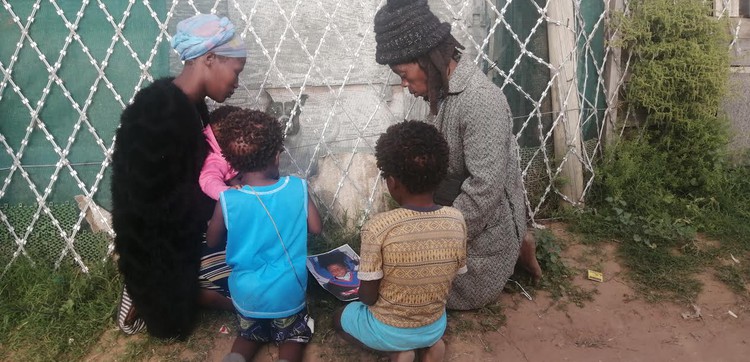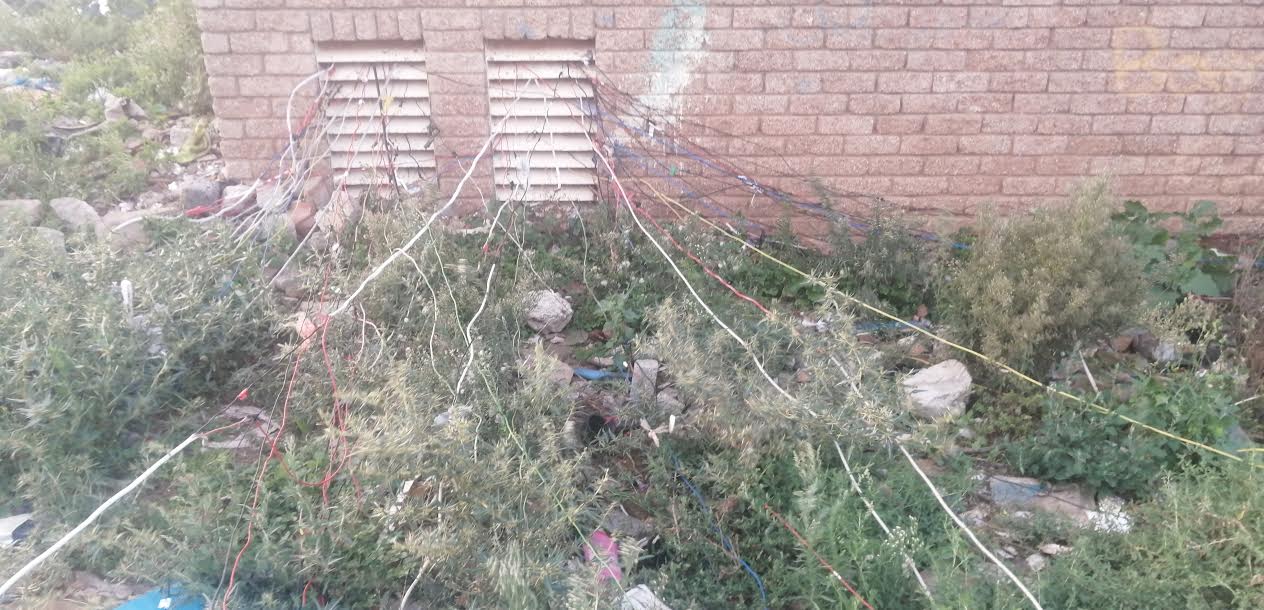
Sharon Plaatjies and Raldo Bell with their sons Rowdin and Usher mourn the death of their first-born, Royden, near the razor fence where he was electrocuted. Photo: Mkhuseli Sizani
19 March 2020
Tensions are high in Riemvasmaak informal settlement in Bethelsdorp, Port Elizabeth, ahead of the funeral of nine-year-old Royden Plaatjies. He was electrocuted by izinyoka lines last Thursday morning while playing ball with two of his little brothers near his home.
Residents say they plan to block roads and burn tyres after Royden’s funeral on Saturday in protest against their living conditions. Three weeks ago they handed a petition to their ward councillor and municipal human settlements officials, demanding electricity and street lights.
But the issue of land ownership is standing in the way of development. The land has been owned by the Fernwood Park Community Trust since November 2013. The trust wants the municipality to sign a memorandum of understanding to develop the land. But the municipality says it cannot install services on land which is privately owned.
The 15-year-old settlement is overcrowded, with approximately 500 households and four working communal taps out of seven. The residents make illegal electricity connections from a nearby substation in Rockridge. The izinyoka lines are scattered on the ground and some hang over the shacks or run through fences. Rubbish is also not collected. Residents make use of the bucket system.
Royden’s father Raldo Bell said Royden had not gone to school on Thursday because exams were over. He and his wife Sharon Plaatjies had gone to town, leaving Royden in the yard playing marbles with his brothers.
“Later I received a call from my sister telling me that my son had been rushed to West End Clinic after being shocked.”
Bell said according to Royden’s friends the child had played ball with his brothers and had stopped to stand in the shade of a shack. “He accidentally touched an uncovered live electricity wire, ” he said.
Bell said he had never made izinyoka connections.
“For 15 years I have been living here and I never wanted izinyoka connections. I chose to make wood fires to protect my kids from these deadly wires. But today I am heartbroken because my son has been killed by izinyoka lines.”
Plaatjies said the Nelson Mandela Bay Municipality should be held accountable for her son’s death.
“He would be still alive if the municipality had given the people the electricity they have been fighting for.”
Riemvasmaak community leader Gail Lean said four people had been killed by izinyoka lines in five years. “Every time we lose a child here, our leaders come and promise us electricity. After this funeral we are going back to the streets and we will make this place ungovernable. We will burn tyres and block the roads until we are given clear answers about the development of our area,” she said.
“The trust and the municipality should also resolve their issues. All that we want is electricity and we are willing to pay for it,” she said.
Felicia Lethese, chairperson of the trust, blames the municipality.
“We are willing to hand over the ownership of our land. But we need a legally binding document that will give us a guarantee that we will all benefit. We also need a time frame of when and how our land will be developed.”
Lethese said the community should not fight with the trust. Three of the five trustees live in Riemvasmaak.
“This land belongs to all of us. But we can’t just give our land to the politicians who will at the end of the day turn against us.”
“Watching our people dying of izinyoka and shack fires is too much. The municipality must come on board and deliver the service we want,” she said.
Municipal spokesperson Mthubanzi Mniki said the municipality could not develop private property. “The only time we can develop this land is after it is transferred to the municipality for ownership,” he said.
Meanwhile, he said, “We have warned and continue to warn people against illegal connections because they are a danger to society, especially to children”.
Police spokesperson Captain Sandra Janse van Rensburg said an inquest docket had been opened after Royden’s death. She confirmed that there had been previous accidents with electrical connections but she could not say how many.

The electricity sub-station where residents connect izinyoka lines. Photo: Mkhuseli Sizani